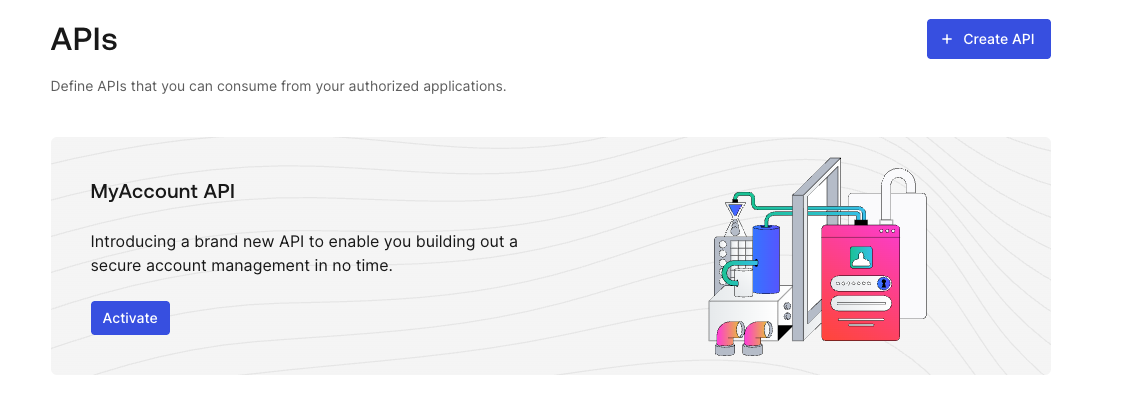Using Auth0 domain vs. custom domainThe My Account API supports using your canonical Auth0 domain or your custom domain, but you must use the same one throughout the entire process, including:
- Getting an access token
- Setting the
audiencevalue - Calling the My Account API endpoint
Activate the My Account API
You can activate the My Account API for your tenant in the :- Navigate to Applications > APIs.
- Locate the MyAccount API banner.
- Select Activate.

require_client_grantfor user flowsdeny_allfor client (machine-to-machine) flows
allow_all, which allows any application in your tenant to request any scope from the My Account API.
Auth0 does not recommend using allow_all for user access flows because the My Account API exposes sensitive information and operations. You should follow a least privilege principle with My Account API to ensure applications only get access to what they truly need, minimizing potential security risks.
The final permissions granted to the application will be determined by the intersection of the scopes allowed by the application API access policy, the Role-Based Access Control (RBAC) permissions assigned to the end user, and any user consent given (if applicable).
You cannot update the application API policy for client access to the My Account API, which means you cannot access the My Account API using the Client Credentials Flow.
Get an access token
You can get an for the My Account API in the same way you’d get an access token for one of your own APIs.If you’re going to allow the My Account API to perform sensitive operations (such as enrolling an authentication method), we strongly recommend that you use step-up authentication to enforce additional security policies through multi-factor authentication (MFA).
- Call Your API Using the Authorization Code Flow
- Call Your API Using the Authorization Code Flow with PKCE
Audience
The of the My Account API ishttps://{yourDomain}/me/.
Scope
The My Account API supports the following scopes:| Scope | Description |
|---|---|
create:me:authentication_methods | Allows the user to enroll a new authentication method. |
read:me:authentication_methods | Allows the user to view existing authentication methods. |
update:me:authentication_methods | Allows the user to modify existing authentication methods. |
delete:me:authentication_methods | Allows the user to modify existing authentication methods. |
read:me:factors | Allows the user to view the factors they can enroll. |
| Scope | Description |
|---|---|
create:me:connected_accounts | Allows the user to connect a new account to their user profile. |
read:me:connected_accounts | Allows the user to view the existing connected accounts linked to their user profile. |
delete:me:connected_accounts | Allows the user to delete a connected account from their user profile. |
Examples
Universal Login with authorization code flow
Step 1: Request authorization code
Step 2: Exchange code for access token
Embedded login with native passkeys
Step 1: Request login challenge
Step 2: Authenticate existing user
Rate limits
During Early Access, the My Account API is limited at a tenant level to 25 requests per second.Cross-Origin Requests
If you intend to call the My Account API directly from a browser-based application (like a Single Page Application) running on a different domain than your Auth0 tenant, you will encounter browser security policies known as Cross-Origin Resource Sharing (CORS). By default, browsers block these cross-origin requests. To allow your application to successfully make requests to the API, you must add your application’s domain (its “origin”) to your client’s configuration:- Navigate to Dashboard > Applications. Select the application to view.
- Under Cross-Origin Authentication, toggle on Allow Cross-Origin Authentication.
- Locate Allowed Origins (CORS), and enter your application’s origin URL.
- Select Save.
If you do not need to use CORS for your application, ensure that Allow Cross-Origin Authentication is toggled off. Adding your application’s URL to this list tells Auth0 to trust requests from that origin, allowing your client-side application to access the API.

